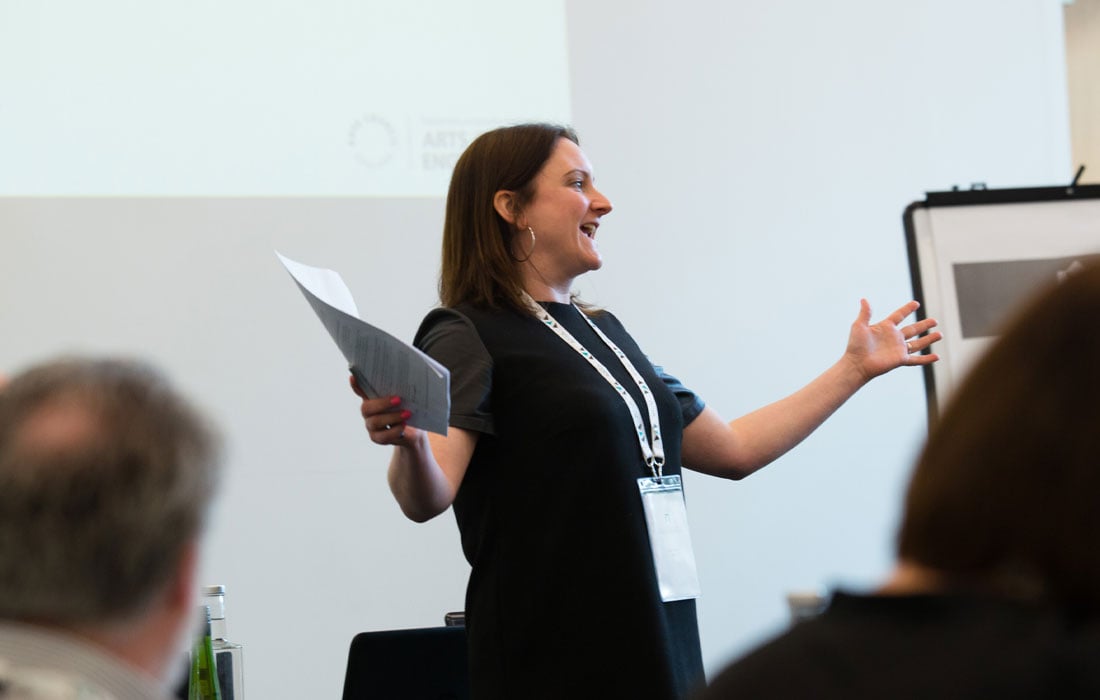
Future Proof Museums Residential 2017
Photo: © Leo Cinicolo
Leading at all levels
How can we best develop leaders for the future? Cath Hume suggests we start by creating more leadership opportunities throughout the organisation.
We talk a lot about leadership, but who are we referring to exactly? 'Leaders' can be shorthand for CEOs, directors and board members – but that doesn’t take into account that we can all be leaders wherever we are in our careers. I believe it is crucial that leadership should be fostered and encouraged by creating opportunities for individuals to lead at all levels in an organisation.
Along with improving team retention, investing in a flatter, more collaborative and diverse leadership improves succession planning
To develop leadership at all levels you need to invest in the interpersonal skills within the team. When budgets are tight I see organisations strip back training budgets, contributing to organisational decline. Investing in your team brings greater expertise into the organisation and it improves team morale and loyalty. According to LinkedIn’s 2018 global workplace learning trends report 94% of employees would stay at a company longer if it invested in their career.
Along with improving team retention, investing in a flatter, more collaborative and diverse leadership improves succession planning. And more importantly, it allows us to be more productive and meet the many challenges we face more effectively.
Leadership development
Forbes, the American business magazine, recently looked at how best to develop leadership for people working at all levels within an organisation. Here are three of its findings:
- Gain leadership support: This is about the importance of everyone at any management level being behind the development of leadership across the team.
- Make leadership a key performance indicator: Make leadership development a key outcome for all managers. To quote the report: “In order to be a learning and development-focused organisation, it has to be modelled from the top with cascading accountability throughout your team(s).”
- Reconnect employees to the higher purpose: Ensure everyone in the team understands your organisation’s reason for being and can see their place in it. This will ensure they feel invested and encourage a stronger sense of ownership.
Communication skills
The need for more collaborative models of leadership, and recognition of their benefits, are echoed in the report Changing Cultures – transforming leadership in the arts, museums and libraries, commissioned by Arts Council England. It highlights the importance of developing softer communication skills and internal agency, and at the AMA we are exploring new ways to support this.
We are excited about a new partnership with RADA Business which will see us learning to ‘rewire our bodies’ and improve our communication skills through our physicality.
And in July, at this year’s AMA Conference in NewcastleGateshead, we will also be sharing insights into internal communications.
You can find resources on leadership research, case studies and support on AMAculturehive.
Team leadership
So how do we give our team at the AMA the opportunity and skillset to lead? We want everyone to feel invested in the impact we can have. So everyone was involved in developing our new vision and mission statement, and we have all made a joint commitment to become a diverse organisation. Our culture is very open, so anyone with a good idea or a question about how we do things feels able to contribute and is listened to. While we each have areas of focus, it is our collective responsibility as a team to get things done.
This mindset means that team members have agency. Giving team members agency is important. As part of our sector support organisation work, we run a number of programmes that are about making change to digital marketing practice, audience development practice and organisational practice. We see the biggest impact within these programmes for people who have agency within their organisations. For those where hierarchy and process stall their desire to drive change, we see frustration and more limited impact.
The rules of how we work can promote or inhibit agency, and as always, organisational culture is critical. Our flexible working policies make a big difference. Everyone in our team is motivated to achieve great things and we don’t need to worry about where or when they get things done. I don’t have the time or inclination to micro-manage anyone, and I trust in the team to do their jobs. I ask questions and I’m there whenever the team need me, but I know that they are competent people who need support and trust to do the best job they can. This helps colleagues to take responsibility and to have a sense of agency.
We are always learning and striving to be an organisation that gets all of this right. We’ve started with our values and built on these. Leadership at all levels is key to this.
Cath Hume is CEO at the AMA.
www.a-m-a.co.uk
Tw @CathHume | @amadigital
This article, sponsored and contributed by AMAculturehive, is part of a series sharing resources and learning from the online library for the sector.
Join the Discussion
You must be logged in to post a comment.